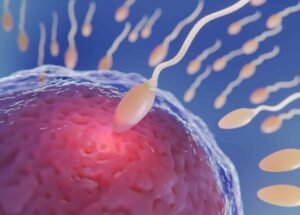Causes and Treatment for Male Infertility
Discussions often centre on women’s reproductive health, when the topic of fertility arises leaving male fertility somewhat in the shadows. However, male fertility is just as crucial in conception, and understanding its intricacies can be the key to overcoming challenges in starting a family. Whether you’re simply looking to understand more about this vital aspect of male health or currently facing fertility issues, this blog will provide you with a comprehensive overview of male fertility, the common causes of infertility in men, and the various treatment options available.
What Is Male Fertility?
Male fertility refers to a man’s ability to father a child, which hinges on several factors working together in harmony. For a man to be fertile, his body must produce healthy sperm that can successfully travel to and fertilize a woman’s egg. The process involves the testes producing sperm, which is then stored in the epididymis. During ejaculation, the sperm mixes with seminal fluid to create semen, which is then ejaculated out of the penis.
The complexity of this process means that male fertility is influenced by multiple factors that include hormonal balance, physical health, lifestyle, and environmental factors. A small disruption in any of these areas can lead to sperm disorders, making it difficult or impossible to conceive naturally.
Causes of Male Infertility
Male infertility is a common issue, affecting millions of couples worldwide. Understanding the causes of male infertility is crucial in determining the right course of treatment. Here, we’ll delve into the most common factors that can impact male fertility.

1. Sperm Production Problems
The most common cause of male infertility is issues related to sperm disorders. These problems can range from low sperm count (oligozoospermia) to poor sperm motility (Asthenozoospermia) or even abnormal sperm shape (teratozoospermia). In some cases, men may have a complete absence of sperm in their ejaculate, a condition known as azoospermia.
Several factors can contribute to sperm disorder:
– Genetic Factors:
Certain genetic conditions, such as Klinefelter syndrome, can affect sperm production. These genetic disorders often result in abnormal development of the male reproductive organs, leading to reduced or absent sperm production.
– Hormonal Imbalances:
Hormones play a crucial role in regulating sperm production. Imbalances in hormones such as testosterone, luteinizing hormone (LH), and follicle-stimulating hormone (FSH) can lead to decreased sperm production and contribute to zoospermia conditions.
– Infections:
Infections of the reproductive organs, such as epididymitis or orchitis, can damage the testes and impact sperm production. Sexually transmitted infections (STIs) can also cause blockages that prevent sperm from being ejaculated.
– Lifestyle Factors:
Lifestyle choices such as smoking, excessive alcohol consumption, drug use, and obesity can negatively affect sperm production. Stress and poor diet can also contribute to hormonal imbalances, further impacting fertility and potentially leading to different forms of zoospermia.
2. Structural Issues
Sometimes, male infertility can be caused by physical blockages or structural abnormalities within the reproductive system. These issues can prevent sperm from being successfully ejaculated, even if sperm production is normal.
– Varicocele:
A varicocele is a condition characterized by enlarged veins within the scrotum. This can cause increased heat around the testes, leading to reduced sperm production and quality, which can be classified under zoospermia.
– Obstructions:
Blockages in the ducts that transport sperm, such as the vas deferens or the epididymis, can prevent sperm from reaching the semen. These obstructions can be caused by infections, injuries, or congenital conditions.
– Ejaculatory Duct Obstruction:
This condition occurs when the ducts that carry sperm out of the penis are blocked, leading to a low or absent sperm count in the ejaculate.
3. Sexual Dysfunction
Sexual dysfunctions, such as erectile dysfunction (ED) or premature ejaculation, can also contribute to male infertility. These issues can prevent successful intercourse, making it difficult for sperm to reach the egg, potentially compounding the effects of existing sperm issues.
– Erectile Dysfunction:
ED is the inability to achieve or maintain an erection sufficient for sexual intercourse. It can be caused by a range of factors, including cardiovascular disease, diabetes, psychological issues, or certain medications.
– Retrograde Ejaculation:
This occurs when semen enters the bladder instead of being ejaculated out of the penis. It can be caused by certain surgeries, medications, or conditions like diabetes.
4. Environmental and Occupational Factors
Environmental and occupational exposures to certain chemicals, toxins, and heavy metals can also impact male fertility. For example, exposure to pesticides, lead, or radiation can damage sperm production or lead to DNA abnormalities in sperm, contributing to zoospermia.
– Heat Exposure:
Prolonged exposure to high temperatures, such as in hot tubs or saunas, can impair sperm production. Similarly, occupations that involve sitting for long periods, like truck driving, can increase scrotal temperatures and negatively affect sperm quality, potentially leading to various forms of zoospermia.
– Toxins and Chemicals:
Certain chemicals, such as those found in pesticides, industrial pollutants, and heavy metals, can interfere with hormone production and damage sperm DNA, contributing to zoospermia conditions.
5. Medical Conditions and Treatments
Certain medical conditions and their treatments can also lead to male infertility. Understanding these potential impacts is essential for men undergoing medical treatment.
– Cancer Treatments:
Chemotherapy and radiation therapy can severely impact sperm production, often leading to temporary or permanent infertility, classified under azoospermia or other sperm conditions. Testicular cancer and its treatment can also affect fertility.
– Chronic Illnesses:
Chronic conditions such as diabetes, cystic fibrosis, or kidney disease can negatively impact male fertility. These conditions can lead to hormonal imbalances, sexual dysfunction, or other issues that reduce fertility, potentially resulting in various sperm disorders.
– Medications:
Some medications, particularly those used to treat high blood pressure, depression, and some antifungal and antibiotic drugs, can affect sperm production or lead to sexual dysfunction, contributing to zoospermia or other sperm-related conditions.
Treatment Options for Male Infertility
The good news is that male infertility is often treatable, and there are various options available depending on the underlying cause. Here’s a breakdown of some common treatments:
1. Lifestyle Modifications
Sometimes, making simple lifestyle changes can significantly improve male fertility. If lifestyle factors are contributing to infertility, your doctor may recommend:
– Quitting Smoking:
Smoking has been linked to zoospermia and motility, as well as increased sperm DNA damage. Quitting smoking can improve sperm health and increase the chances of conception.
– Reducing Alcohol Intake:
Excessive alcohol consumption can negatively affect sperm production and quality. Limiting alcohol intake can help improve fertility.
– Maintaining a Healthy Weight:
Obesity is associated with hormonal imbalances that can reduce sperm production. Losing weight through a balanced diet and regular exercise can improve fertility and reduce the risk of zoospermia.
– Managing Stress:
Chronic stress can interfere with hormone production and sexual function. Finding effective ways to manage stress, such as through exercise, meditation, or therapy, can help improve fertility.

2. Medications
If hormonal imbalances or other medical conditions are contributing to infertility, medications may be prescribed to address these issues. Few common medications used to treat male infertility includes:
– Hormone Therapy
: If low testosterone levels are affecting sperm production, hormone replacement therapy may be recommended. Other medications can be used to stimulate the production of hormones that regulate sperm production.
– Antibiotics:
If an infection is causing infertility, antibiotics may be prescribed to treat the underlying infection and prevent further damage to the reproductive organs, potentially preventing sperm complications.
– Erectile Dysfunction Medications:
If sexual dysfunction is contributing to infertility, medications such as sildenafil (Viagra) or tadalafil (Cialis) may be prescribed to help achieve and maintain an erection.
3. Surgical Treatments
In cases where structural issues are causing infertility, surgery may be required to correct the problem. Some common surgical treatments for male infertility include:

– Varicocele Repair:
Surgery to repair a varicocele involves tying off the enlarged veins to restore normal blood flow to the testicles. This can improve sperm production and quality.
– Vasectomy Reversal:
If a previous vasectomy is causing infertility, a vasectomy reversal can be performed to reconnect the vas deferens and restore the flow of sperm.
– Sperm Retrieval Procedures:
In cases of azoospermia, where no sperm is present in the ejaculate, surgical procedures such as testicular sperm extraction (TESE) or percutaneous epididymal sperm aspiration (PESA) can be used to retrieve sperm directly from the testicles or epididymis.
4. Assisted Reproductive Technologies (ART)
For many couples, assisted reproductive technologies (ART) offer a viable path to parenthood. ART includes a range of techniques designed to help couples conceive, even in cases of severe male infertility.

– Intrauterine Insemination (IUI):
In IUI, sperm is collected, washed, and then directly injected into the woman’s uterus during ovulation. This procedure increases the chances of sperm reaching and fertilizing the egg.
– In Vitro Fertilization (IVF):
IVF involves collecting eggs from the woman’s ovaries and fertilizing them with sperm in a laboratory. The resulting embryos are then implanted into the woman’s uterus. IVF is often used in cases of severe male infertility or when other treatments have failed.
– Intracytoplasmic Sperm Injection (ICSI):
ICSI is a specialized form of IVF where a single sperm is directly injected into an egg to facilitate fertilization. This technique is often used in cases of low sperm count, poor sperm motility, or other severe sperm abnormalities (zoospermia).
5. Counselling and Support
Dealing with infertility can be emotionally challenging for both partners. Seeking counseling or joining a support group can provide emotional support, help manage stress, and improve communication between partners. Mental health professionals specializing in fertility issues can offer coping strategies and guide couples through the emotional aspects of infertility treatment.
Alternative Therapies for Male Infertility
While conventional medical treatments are the primary approach to treating male infertility, some men explore alternative therapies as complementary options. It’s important to approach these with caution and consult with a healthcare provider before trying any alternative treatments. Some commonly explored options include Herbal supplements, Acupuncture, Diet and Nutrition.
The Road to Parenthood
Male fertility is a complex and multifaceted issue that can be influenced by a wide range of factors. The first step towards overcoming fertility challenges is understanding the causes of male infertility and the available treatment options. Whether it’s through lifestyle changes, medical treatments, or assisted reproductive technologies, many paths can lead to successful conception.
By understanding male fertility and taking proactive steps, you’re giving yourself the best chance of achieving your goal of becoming a parent. It’s important to approach this journey with an open mind and a positive attitude. Fertility treatments can take time, and the road to parenthood may be longer than expected. Many couples face fertility challenges, and seeking help is a sign of strength. Remember, you’re not alone in this journey.


